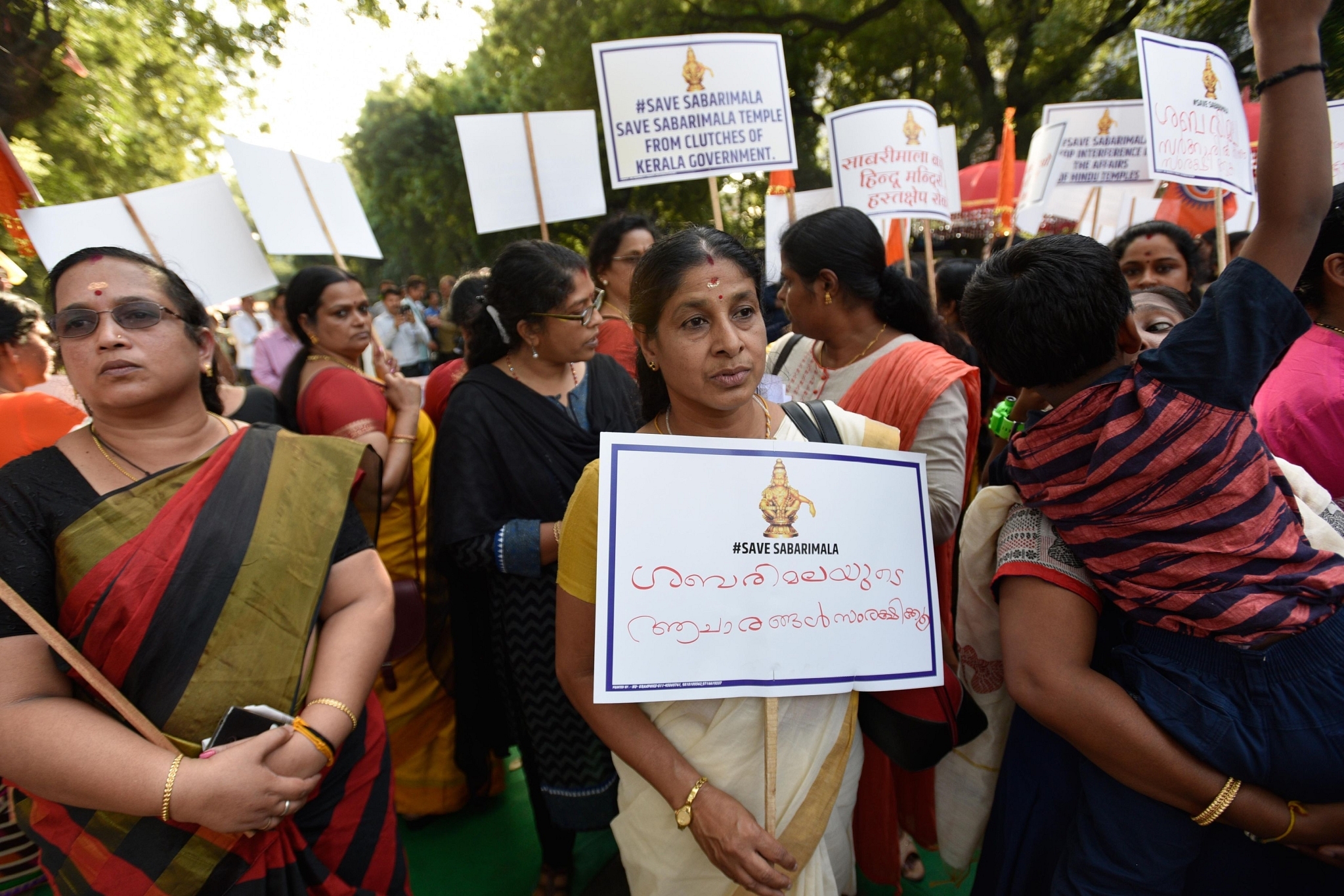Culture
SC Allows Sabarimala Verdict Review, But Larger Battle Ahead For Devotees
- The latest Sabarimala decision by the top court is a minor victory for devotees but the larger battle remains to be won.

Members of Sabarimala Ayyappa Seva Samajam take part in a rally. (Biplov Bhuyan/Hindustan Times via Getty Images)
You can also read this article in Hindi- भले ही सबरीमाला का मामला बड़ी पीठ को सौंपा गया है लेकिन लंबी लड़ाई शेष है
The decision of the Supreme Court to refer the Sabarimala verdict delivered last year to a larger bench of seven judges is the right one. This means the devotees of Swami Ayyappa have won a minor victory in seeking a review of the previous judgement, which went 4:1 against them, but the larger battle remains to be won.
The bench, headed by outgoing Chief Justice of India Ranjan Gogoi, agreed to the review with a narrow 3-2 majority, with Justice D Y Chandrachud and Justice R F Nariman dissenting. This could be because the bench felt that the issue of women’s entry into places of worship involves not only Hindus with reference to Sabarimala, but also Muslim women in mosques and Parsis in their temples.
The separate case of female genital mutilation (FGM) practised by some Shia sects in India could also come under this reference. It all depends on how the next Chief Justice, Sharad Bobde, defines the issues when that bench is created. That bench will also have to take a call on what constitutes “essential religious practices”, and whether these can be held to be against individual rights to free worship.
In fact, when the court agreed to hear petitions by some Muslim women to enter mosques, Justice Bobde specifically said that this was being done only because of the Sabarimala judgement upholding a woman’s right to pray, which trumped the specific practices of specific shrines. In Sabarimala, the lone woman judge, Indu Malhotra, refused to go along with her four male colleagues in ending the practice of banning the entry of women in the reproductive ages of 10-50 from entering the temple.
However, there are problems in clubbing Sabarimala with the general Muslim ban on women entering mosques. In Sabarimala, the deity is worshipped as a Naisthika Brahmachari (eternal celibate). No other Ayyappa temple has this entry ban as the deity is not worshipped as a celibate in those places.
To be sure, not all mosques keep women out. They are kept out only in mosques run by major Sunni groups. Mosques run by the Jamaat-e-Islami and some other denominations do not observe such restrictions.
This is why the question on certain temples or mosques having unique practices needs to be weighed against the broader principle of everyone’s right to pray. It is certainly a constitutional principle that needs to be decided one way or the other.
While the seven-judge bench will have the final word, it is worth mentioning that Sabarimala cannot be straitjacketed into a black-and-white case of discrimination versus non-discrimination. There is no structural discrimination against women in Sabarimala just as there is no structural discrimination against men in temples (like Kamakhya) where women are given pride of place.
Sabarimala’s unique practices are confined to one unique temple, and can be defended as an acceptable form of diversity not amounting to discrimination. One hopes the bench looks at this aspect more closely instead of reducing the issue to a conflict between religious practices and an individual’s right to pray. The issue of allowing women to pray in mosques, however, is more generic in nature, as is the issue of female genital mutilation (FGM) among some Muslim groups, which is an assault on the rights of children who are in no position to object. The right to FGM has to be an adult choice, something each female can decide for herself if she wants to respect this part of religious practice once she is old enough to take a decision on her own, without coercion by family and society.
The one huge mistake the Sabarimala bench has made is in not staying the previous judgement allowing women’s entry. This stay ought to have been given until the seven-judge bench takes a final call. By not staying the earlier judgement, the bench has essentially changed the rules of the game and allowed women in the 10-50 age group the right to legal entry even before the rules are actually decided. How is it fair to devotees, who accept and believe that the restriction is fair, if they are again pitted against a recalcitrant state government which wants to forcibly defeat Sabarimala’s uniqueness? Traditions once broken are difficult to restore or defend.
Without a stay, Lord Ayyappa’s devotees will again have to battle the state’s might on the streets.
The seven-judge bench should take the call under Justice Bobde once he becomes Chief Justice. A stay of the previous judgement should be the first item on his menu. You cannot change ground rules when you are yet to decide on the ground rules.
Introducing ElectionsHQ + 50 Ground Reports Project
The 2024 elections might seem easy to guess, but there are some important questions that shouldn't be missed.
Do freebies still sway voters? Do people prioritise infrastructure when voting? How will Punjab vote?
The answers to these questions provide great insights into where we, as a country, are headed in the years to come.
Swarajya is starting a project with an aim to do 50 solid ground stories and a smart commentary service on WhatsApp, a one-of-a-kind. We'd love your support during this election season.
Click below to contribute.
Latest